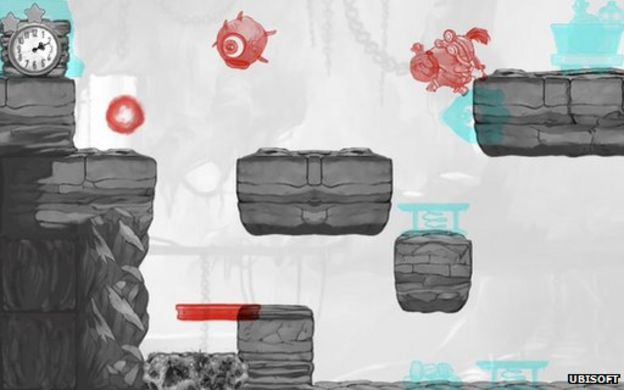Ubisoft has announced it is working on a video game to combat an eye disorder that can cause reduced vision.
Dig Rush is designed to be played on tablets by people diagnosed as having Amblyopia - also known as "lazy eye".

The condition affects an estimated one in 50 children, according to the NHS, and often causes them to see less clearly out of one eye than the other.
Ubisoft said it hoped the game would be "more engaging and enjoyable" than existing treatments.
The technique involved was developed by researchers at McGill University in Montreal, Canada, who initially carried out tests using a version of the blocks-turning game Tetris before publicising their discovery in 2013.
French developer Ubisoft is best known for making entertainment-focused video games including the Assassin's Creed and Far Cry series, as well as the choreography-focused franchise Just Dance.
3D glasses
Patients will need to wear stereoscopic glasses to benefit from the treatment
Its announcement was timed to coincide with the Game Developers Conference (GDC) in San Francisco.
Blocked objects
Dig Rush requires the patient to wear blue-red stereoscopic glasses - similar to the ones used for old 3D movies - while playing.
It works by showing some of its graphics in blue and some in red at differing levels of contrast, so that each of the objects they represent becomes harder to see by one of the eyes.
This forces the player to use both their dominant and weaker eyes together in order to make progress, rather than just relying on their stronger one or only seldom using the weaker one.
Through repeated training, the player's brain should learn to improve co-ordination of both eyes, helping the weak eye relearn how to see and potentially improving their sense of depth as a result.
Ubisoft said doctors would have the ability to adjust the game's settings to suit specific patients' conditions.
Eye patch alternative
Left untreated, Amblyopia can result in the central vision of a person's "lazy eye" never reaching normal levels.
Studies carried out by the McGill team suggest two-thirds of people who play such games regularly should experience improved vision in their weaker eye.
Amblyotech - a company that bought the researchers' invention and licensed it to Ubisoft - said it believed the game was more effective than alternative techniques.
"Current treatments options, such as eye patching, provide limited relief and have poor patient compliance due to discomfort and social stigmas," said Joseph Koziak, Amblyotech's chief executive.
He suggested that both children and adults could benefit from the treatment.
Dig Rush
Amblyotech suggests people will be more willing to play the game than wear an eye patch to treat the condition
Amblyotech is currently seeking permission from the US Food and Drug Administration (FDA) to market the therapy in the US. It acknowledges it will have to go through similar approval processes elsewhere before the game can be made available.
The Royal College of Ophthalmologists - which represents eye doctors in the UK - said it would need to see further evidence before being able to support the idea of medics prescribing the title.
"The use of digital media is and has been researched and studied and shown to have some benefit," said a spokeswoman.
"As with all treatments, their use must be based on scientific research and evidence to ensure a safe and effective benefit for patients."
http://www.bbc.com/news/technology-31721672Personalmente me parece algo muy interesante. Yo fui un niño amblíope tratado como se hacía antes, pero el llevar un parche (como a todos los que lo hemos llevado), nos ha dejado bastante (o incluso completamente) estereociegos.
La base científica del juego en cuestión proviene de un estudio que dice que la gente tratada con este tipo de juegos puede recuperar incluso la visión binocular y la estereoagudeza.

![carcajada [carcajad]](/images/smilies/nuevos/risa_ani2.gif) ).
).